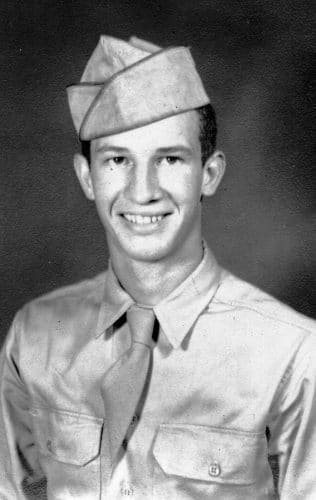The Destiny of Nations
Armistice Day was observed in the United States to mark the end of World War I until 1954, when President Eisenhower signed a proclamation declaring it would henceforth be known as Veterans Day, “in order that a grateful nation might pay appropriate homage to the veterans of all its wars.”
My grandfather, Raymond F. Olinger, was on a battlefield in France on what would become Armistice Day, serving as a second lieutenant in the 805th Pioneer Infantry.
The 805th’s published regimental history describes shipping out to France: “It was a wonderful night, Aug. 29, 1918, when we departed Camp Funston (Kansas) on our way to take part in shaping the destiny of nations.”
The 805th was a segregated supply regiment of black enlisted men and white officers, often assigned to manual labor, assisting engineers at the front, and recovering the dead from battlefields. They also fought, and saw 39 days of action in the Meuse-Argonne Offensive—the largest military engagement in U.S. history—where 25,000 Americans died and 90,000 were wounded.
The regimental history puts it this way: “Nov. 4 found us in a little town called Charpentry that the Germans had wiped off the map. We were here Nov. 11, when the armistice was signed. It was a wonderful night.” PFC Raymond H. Olinger in 1945. Courtesy Ted Olinger
PFC Raymond H. Olinger in 1945. Courtesy Ted Olinger
My father, Raymond H. Olinger, didn’t even know his father had been in the war until one day in the 1930s when a black Pullman porter stopped them on a train and said, “Hello, Lieutenant Olinger.”
Grandmother had burned Grandfather’s Army trunk with all of his uniforms, letters and souvenirs.
My dad joined the Army in 1945 after graduating from high school at the top of his class of 20 in Buxton County, Kansas, when he was 17. He was in boot camp in North Dakota training for the invasion of Japan when Hiroshima was bombed.
Ray deployed as a military police officer and was billeted in the former Third Imperial Guard Regiment barracks in Tokyo. His unit was meant to monitor and control the local population but spent the bulk of its time enforcing Douglas MacArthur’s first general orders: that allied personnel were not to accost civilians and were forbidden to eat any of their scarce food.
My dad grew up on a southeast Kansas farm in the Great Depression and, though he didn’t know it, poor. By the age of 9 he knew how to work in the fields and at school, how to ride and shoot, how to trap and skin rabbits, and how to roll his own cornhusk cigarettes.
He was appalled by the behavior of some of his fellow GIs toward the starving population in Japan. The only violence he experienced was at the hands of AWOL soldiers, one of whom opened fire on his jeep with an M1 carbine in downtown Tokyo.
Ray discharged his own weapon in action only once, while serving guard duty on a train to Sasebo transporting Korean men conscripted by the Imperial Army for hard labor during the war. They were to be repatriated by force since many did not want to return to their homeland, reputed to be in worse condition than Japan. The guards were stationed on the train carriage roofs for the journey through the night with orders to shoot anyone who attempted to escape, and many did when the train slowed or stopped. My dad and his fellow guards, 18- and 19-year-olds all, dutifully fired their rifles—into the air—having agreed that no one deserved to be shot in the back for refusing to go home.
He was later promoted to sergeant, climbed Mount Fuji, and dined with the daughter of Admiral Yamamoto, the man behind the attacks on Pearl Harbor and Midway. After returning to the States, he went to college on the GI bill and was on his way to law school when the Korean War broke out and he was recalled to active duty.
His unit, the 3rd Battalion of the 8th Cavalry—the storied Rocking Horse Regiment formed in 1866—was overrun and annihilated by Chinese forces in the Battle of Unsan in 1950.
My dad had left the brigade by then to be trained as an officer. He remained in the reserves until the end of the Vietnam War.
My dad died of lung cancer in 2003 and in those last days told me that serving in the military had been the greatest adventure of his life, but: “I was awfully put out when I had to go back.”
It seems a quaint notion, on this 100th anniversary of Armistice Day, to be “awfully put out,” when so many service members now take on multiple deployments to fight our longest war.
In his Veterans Day proclamation, Eisenhower acknowledged that we had engaged in two great wars since the war to end all wars in 1918 and, echoing another president anxious for our destiny, said “let us reconsecrate ourselves to the task of promoting an enduring peace, so that their efforts shall not have been in vain.”
Ted Olinger lives in Vaughn.
UNDERWRITTEN BY THE FUND FOR NONPROFIT NEWS (NEWSMATCH) AT THE MIAMI FOUNDATION, THE ANGEL GUILD, ADVERTISERS, DONORS AND PEOPLE WHO SUPPORT INDEPENDENT, NONPROFIT LOCAL NEWS